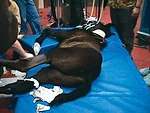Advertise Follow Us
Articles Tagged with ''Equine Veterinarian''
Polishing The Image: Learn To Use X-rays, Imaging Tools Properly
French equine veterinarian urges farriers to learn to use X-rays, other imaging tools, properly
Read More
When That Problem Horse Needs To Be Tranqulized
With growing liability concerns, farriers need to work closely with equine veterinarians when it comes to tranquilizing horses for footcare work
Read More
All's Well At Stone Well
From Upstate New York, Brent Chidsey’s distinctive shoeing bodies spread across the country
Read More
Product Innovations
New Glass Horse Product Offers Journey Inside The Distal Limb
Interactive computer program a valuable, educational tool
Read More
Local Association Spotlight
That Drive To Organize
Farriers in Michigan, Vermont getting new opportunity to meet with others
Read More
Tackling Angular And Rotational Deformities In Foals
Foal deformities are becoming severe enough to warrant corrective shoeing or surgery
Read More











